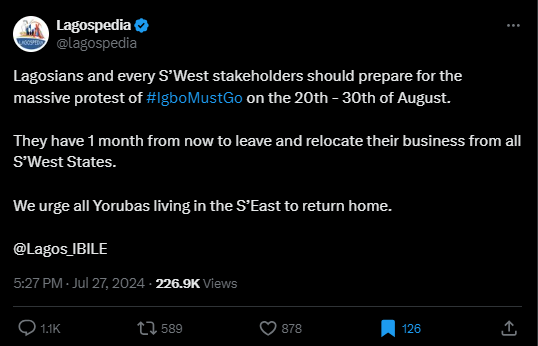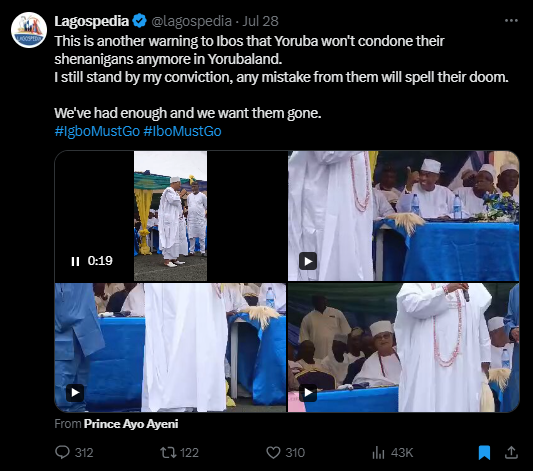
An X (formerly Twitter) handle @Lagospedia, a page claiming to be “proclaiming the virtues of Lagos”, is gaining notoriety for publishing hate comments against the Igbo ethnic group and, most recently, asking them to be pushed out of Lagos.
The call violates Section 41, subsection 1 of the Nigerian Contitution, which states: Every citizen of Nigeria is entitled to move freely throughout Nigeria and to reside in any part thereof, and no citizen of Nigeria shall be expelled from Nigeria or refused entry thereby or exit therefrom.
Ahead of the nationwide #EndBadGovernance protest scheduled to begin August 1, the page has described the action as an Igbo-led attack on Lagos State.
To its over 41,700 followers, Lagospedia claims to be ‘proclaiming the virtues of Lagos’, but on July 27, it tweeted a call for the Yoruba in Nigeria’s southwest to march in protest against Igbos residing in the region.
“Lagosians and every Southwest stakeholder should prepare for the massive protest of #IgboMustGo on the 20th – 30th of August,” Lagospedia tweeted.
“They have one month from now to leave and relocate their business from all southwest states. We urge all Yorubas living in the southeast to return home.”

The call mirrors the May 30, 1967 speech Odumegwu Ojukwu, a former governor of Nigeria’s eastern region, made to Igbos living outside the region. Ojukwu called for Igbos to return to the region and for non-indigenes to leave. Two months later, a civil war broke out.
Similarly, when tensions were high in 1983 and Nigerians felt threatened by the presence of foreigners in the country at a time when unemployment figures were high, the Shehu Shagari administration ordered the expulsion of undocumented migrants.
This move affected over one million Ghanaians who were forced to pack their belongings into sturdy made-in-Ghana bags and leave for their country. The bags earned the name ‘Ghana-Must-Go’ after that episode, and the name became synonymous with xenophobia.
The July 27 post was not the only time Lagospedia tweeted hate comments against the tribe. On July 29, the page tweeted this, a picture of dead bodies it claimed were Igbos, and this, a picture taken during the civil war, showing children of Igbo descent stricken with kwashiokor.

On July 29, Lagospedia tweeted another post: “This is another warning to Ibos that Yoruba won’t condone their shenanigans anymore in Yorubaland. I still stand by my conviction, any mistake from them will spell their doom. We’ve had enough and we want them gone. #IgboMustGo #IboMustGo.”
This page claims the Igbo were responsible for the violence that marred the October 2020 #EndSARS protests, and claims the group was spearheading the #EndBadGovernance protest.
Nigeria is facing its worst economic crisis in decades, with skyrocketing inflation, a national currency in free-fall and millions of people struggling to buy food. Only two years ago Africa’s biggest economy, Nigeria is projected to drop to fourth place this year.
The pain is widespread. Unions strike to protest salaries of around $20 a month. People die in stampedes, desperate for free sacks of rice. Hospitals are overrun with women wracked by spasms from calcium deficiencies.
Although Mr Tinubu increased the minimum wage — after strike action and months-long negotiations with labour unions — from N30,000 to N70,000, his government has increased spending for officials at a time of nationwide starvation.
For workers earning the new N70,000, or $43, per month minimum wage, capricious inflation and naira value have inflicted too much damage for the changes to make any difference in their lives.
The crisis is largely believed to be rooted in two major changes implemented by President Bola Tinubu, elected 14 months ago: the partial removal of fuel subsidies and the floating of the currency, which together have caused major price rises.
A nation of entrepreneurs, Nigeria’s more than 200 million citizens are skilled at managing in tough circumstances, without the services states usually provide. They generate their own electricity and source their own water. They take up arms and defend their communities when the armed forces cannot. They negotiate with armed kidnappers when family members are abducted.
But right now, their resourcefulness is being stretched to the limit.
Some folks are planning protests to voice their concerns about the economic situation, including rising inflation and poverty, under President Tinubu’s administration.
The protests are expected to happen in the north and other parts of the country, but residents and leaders of the south-eastern region, inhabited by the Igbo ethnic group – have made it clear that they are not going to be part of the mass action.
The planned protests have already ignited debates on social media between Mr Tinubu’s supporters — who had previously advocated for similar protests under former president Goodluck Jonathan in 2012 — and next month’s would-be demonstrators.
Mr Tinubu’s government warned that a breakdown of law would not be tolerated, while Nigerians were furious that the same individuals who, in 2012, organised demonstrations against Mr Jonathan’s government for terminating fuel subsidies are now aggressively opposing the same cause under a different leader.
Foundation for Investigative Journalism contributed to this report
KOIKI Media bringing the world 🌎 closer to your door step
